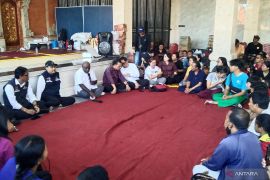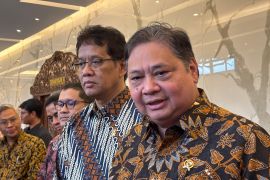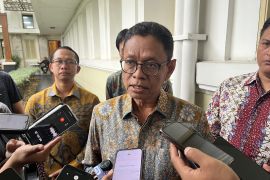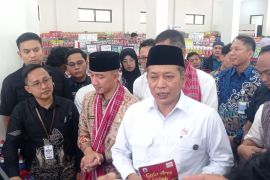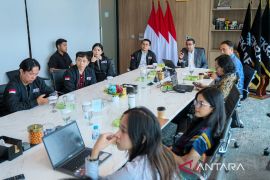Yudhoyono, speaking on the first day of the 67th Session of the UN General Assembly`s General Debate in New York, on September 25, 2012, called for the establishment of an international framework to tackle religious defamation.
The Universal Declaration of Human Rights underlines that in exercising their freedom of expression, everyone must observe morality and public order.
"Freedom of expression is therefore not absolute," Yudhoyono stated.
"However, despite the initiatives taken by the United Nations and other forums, the defamation of religion continues," he added.
"We have seen yet another instance of it in the film, `Innocence of Muslims`, which is now causing an international uproar," Yudhoyono pointed out.
"An international framework should be developed, which can serve as a point of reference for the world community and which must be complied with," he added.
Earlier, Yudhoyono said Indonesia had a "moral obligation to convey its view and appeal", as well as to participate in creating an international protocol on how to prevent or stop actions that could be deemed insulting to any religion.
"In Indonesia, freedom of expression is protected under Article 29 of the country`s constitution. However, the freedom itself is not absolute, meaning there are limitations when it is related to morality and public order," he explained.
As the leader of a nation that celebrates its cultural and religious diversity, Yudhoyono called for mutual respect and understanding among people of different faiths.
"At the same time we can also evolve a universal culture of mutual tolerance and mutual appreciation of one another`s religious convictions," the President noted.
He said every nation also needs to promote "a continuing process of dialogue among people of different faiths and cultures".
"But, of course, this dialogue should not just remain a dialogue, but should translate into actual cooperation so that communities, in which people of different cultures and faiths co-exist, can come together and care for one another," the head of state added.
Over the past decade, several efforts have been made at the UN to implement a framework that prohibits religious defamation, but many Western countries oppose such a framework on the pretext of human rights, freedom of speech, and freedom of expression.
US President Barack Obama, during his speech on the first day of the UN`s General Debate on September 25, said "Innocence of Muslims" was a form of freedom of speech.
"The answer is enshrined in our laws. Our Constitution protects the right to practice free speech. In the US, countless publications provoke offense. As the President of our country, I accept that people are going to call me awful things every day and I will always defend their right to do so," Obama said.
Calling the anti-Islam film "cruel and disgusting", he said his administration could not ban the video that has sparked deadly anti-American violence in many Muslim countries, including an assault on the U.S. consulate in Benghazi, Libya, in which the U.S. ambassador was killed.
Meanwhile, UN Secretary-General Ban Ki-moon was quoted by Reuters as saying the maker of the anti-Islam film had done a "disgraceful and shameful act" and had abused his right to freedom of expression.
"Freedoms of expression should be and must be guaranteed and protected, when they are used for common justice and a common purpose," Ban told a news conference.
"When some people use this freedom of expression to provoke or humiliate some others` values and beliefs, their action cannot be defended," he stated.
"The freedom of expression, while being a fundamental right and privilege, should not be abused by such people," Ban said.
Indonesian Foreign Affairs Minister Marty Natalegawa, during the third RI-US Joint Committee Meeting (JCM), which was also attended by US Secretary of State Hillary Clinton, in Washington DC recently, said Indonesia condemned the anti-Islam film, which was made in the US and was deemed insulting to the Prophet Muhammad.
He also stated that the producer of the movie was "reckless in using his freedom of expression".
"In condemning the blasphemous movie, we must remember that freedom of expression is framed within the context of moral values and public interest, as enshrined in the Universal Declaration of Human Rights," Natalegawa noted.
On behalf of Indonesia, the Indonesian foreign minister also expressed regret over the death of the US Ambassador to Libya and three other diplomats after the attack on the US Embassy in Benghazi.
Meanwhile, the permanent representatives of the UN, who are also members of the Organization of Islamic Cooperation (OIC), strongly condemned the release of the anti-Islam film and cartoons published recently by French magazine "Charlie Hebdo".
The group cited the video and cartoons as "abhorrent examples of incitement to hatred and discrimination against Muslims under the pretext of exercising the individual`s right to freedom of expression and opinion", Islamic news agency IINA reported.
The OIC urged the UN to introduce and implement adequate measures, including legislation against acts of hate crimes, discrimination, violence, and "intimidation caused by negative stereotyping and incitement to religious hatred, violence, and discrimination on the basis of religion".
Before leaving for New York, President Yudhoyono was lauded for his decision to express concern over the West's perception of freedom of expression at the UN meeting.
"President Yudhoyono must utilize his visit to convey the concern of Muslim countries. The governments of Western countries should not suport the kind of freedom of expression that insults Islam," international law expert Hikmahanto Juwana said in Jakarta recently.
He said if the freedom of expression had a negative impact on international security, then the latter should be given priority.
The media in Muslim-majority countries have accused Western countries of double standards following their discriminatory responses to the anti-Islam video and cartoons, which was in contradiction with the way they treated anti-Semitic and holocaust issues.
The French government recently allowed the national media to mock Prophet Muhammad, but banned the democratic right of French Muslims to protest against blasphemous cartoons.
Last year, French security authorities arrested John Galliano, a British fashion designer, in Paris on charges of insulting a couple with anti-Semitic remarks.
Making anti-Semitic remarks is illegal in France and punishable with up to six months in jail. And no Western country, including the United States, or human rights group defended Galliano`s right to freedom of speech or expression in that case.
Whistle-blower Julian Assange and WikiLeaks have been declared "enemies of the state" by the US military. They have been classified under the same legal category as Al-Qaeda and the Taliban, after being accused of releasing classified US military and diplomatic information into the public domain.
"It appears that Julian Assange and WikiLeaks are the enemies," said Michael Ratner, Assange`s US attorney. "An enemy is dealt with under the laws of war, which could include killing, capturing, detaining without trial, etc.", he was quoted by RT as saying. ***1***
(f001/INE/a014)
Reporter: Fardah
Editor: Fardah Assegaf
Copyright © ANTARA 2012



